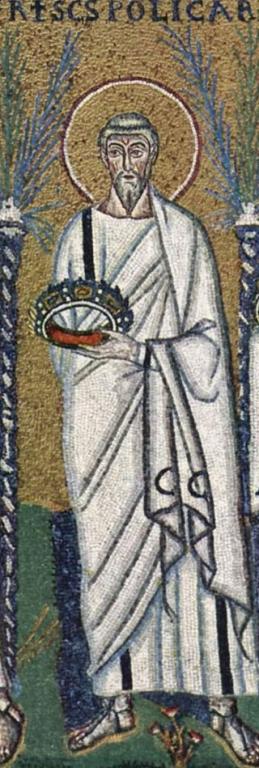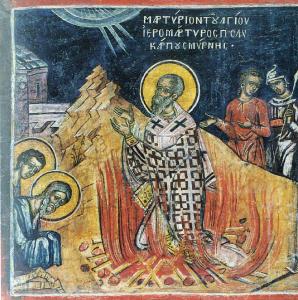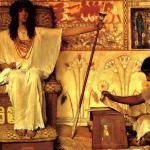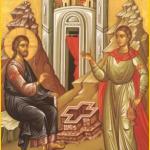In April 2018 General Conference, President Russell M. Nelson prophetically stated that “in coming days, it will not be possible to survive spiritually without the guiding, directing, comforting, and constant influence of the Holy Ghost.” He pled with Latter-day Saints to increase our spiritual capacity to receive revelations.
As I considered the implications presented by his startling statement, I felt led to learn about some ancient day martyrs for truth. Polycarp dropped into my lap.
John the Revelator, purportedly, ordained Polycarp as bishop of Smyrna during the 2nd century AD. And possibly, John referred to Polycarp as the angel of Smyrna in Revelation. Converted to Christianity by the apostles, Polycarp knew John and other apostles and people who actually knew Jesus. He became a purist of gospel truths, ferreting out heresies and those who fostered apostate theories.
In a letter to his friend, Irenaeus shared a memory of Polycarp.
I could tell you the place where the blessed Polycarp sat to preach the Word of God. It is yet present to my mind with what gravity he everywhere came in and went out; what was the sanctity of his deportment, the majesty of his countenance; and what were his holy exhortations to the people. I seem to hear him now relate how he conversed with John and many others who had seen Jesus Christ, the words he had heard from their mouths.
I was fascinated to learn that in Greek, Polycarp means “much fruit.”
The following is a manuscript written by devotees who witnessed Polycarp’s martyrdom which mirrors, to some degree, the martyrdom of another favorite prophet, Abinadi. I admired that Polycarp received revelation regarding his demise. When others caved to fear and pressure, Polycarp’s eternal perspective was such that he didn’t fear death, but viewed his death as a way to witness for Jesus Christ.
Polycarp told his captures that he would stand in the fire without being secured. I loved the image of the fire circling him without burning him. It hearkened back to other fiery furnaces and pillars of fires where the righteous escaped burning. I’ll let you discover, if you don’t know the story yet, Polycarp’s mortal fate.
May we all be full of “much fruit” and as sure in our eternal reward and conviction as Polycarp, bishop of Smyrna.
Polycarp’s Martyrdom

The Letter of the Smyrnaeans or the Martyrdom of Polycarp
Polycarp 3:2
So after this all the multitude, marvelling at the bravery of the God-beloved and God-fearing people of the Christians, raised a cry, ‘Away with the atheists; let search be made for Polycarp.’Polycarp 4:1
But one man, Quintus by name, a Phrygian newly arrived from Phrygia, when he saw the wild beasts, turned coward. He it was who had forced himself and some others to come forward of their own free will. This man the proconsul by much entreaty persuaded to swear the oath and to offer incense. For this cause therefore, brethren, we praise not those who deliver themselves up, since the Gospel doth not so teach us.Polycarp 5:1
Now the glorious Polycarp at the first, when he heard it, so far from being dismayed, was desirous of remaining in town; but the greater part persuaded him to withdraw. So he withdrew to a farm not far distant from the city; and there he stayed with a few companions, doing nothing else night and day but praying for all men and for the churches throughout the world; for this was his constant habit.Polycarp 5:2
And while praying he falleth into a trance three days before his apprehension; and he saw his pillow burning with fire. And he turned and said unto those that were with him: ‘It must needs be that I shall be burned alive.’Polycarp 6:1
And as those that were in search of him persisted, he departed to another farm; and forthwith they that were in search of him came up; and not finding him, they seized two slave lads, one of whom confessed under torture;
Polycarp 6:2
for it was impossible for him to lie concealed, seeing that the very persons who betrayed him were people of his own household. And the captain of the police, who chanced to have the very name, being called Herod, was eager to bring him into the stadium, that he himself might fulfill his appointed lot, being made a partaker with Christ, while they–his betrayers–underwent the punishment of Judas himself.Polycarp 7:1
So taking the lad with them, on the Friday about the supper hour, the gendarmes and horsemen went forth with their accustomed arms, hastening as against a robber. And coming up in a body late in the evening, they found the man himself in bed in an upper chamber in a certain cottage; and though he might have departed thence to another place, he would not, saying, The will of God be done.Polycarp 7:2
So when he heard that they were come, he went down and conversed with them, the bystanders marvelling at his age and his constancy, and wondering how there should be so much eagerness for the apprehension of an old man like him. Thereupon forthwith he gave orders that a table should be spread for them to eat and drink at that hour, as much as they desired. And he persuaded them to grant him an hour that he might pray unmolested;Polycarp 7:3
and on their consenting, he stood up and prayed, being so full of the grace of God, that for two hours he could not hold his peace, and those that heard were amazed, and many repented that they had come against such a venerable old man.Polycarp 8:1
But when at length he brought his prayer to an end, after remembering all who at any time had come in his way, small and great, high and low, and all the universal Church throughout the world, the hour of departure being come, they seated him on an ass and brought him into the city, it being a high Sabbath.Polycarp 8:2
And he was met by Herod the captain of police and his father Nicetes, who also removed him to their carriage and tried to prevail upon him, seating themselves by his side and saying, ‘Why what harm is there in saying, Caesar is Lord, and offering incense’, with more to this effect, ‘and saving thyself?’ But he at first gave them no answer. When however they persisted, he said, ‘I am not going to do what ye counsel me.’Polycarp 8:3
Then they, failing to persuade him, uttered threatening words and made him dismount with speed, so that he bruised his shin, as he got down from the carriage. And without even turning round, he went on his way promptly and with speed, as if nothing had happened to him, being taken to the stadium; there being such a tumult in the stadium that no man’s voice could be so much as heard.Polycarp 9:1
But as Polycarp entered into the stadium, a voice came to him from heaven; ‘Be strong, Polycarp, and play the man.’ And no one saw the speaker, but those of our people who were present heard the voice. And at length, when he was brought up, there was a great tumult, for they heard that Polycarp had been apprehended.Polycarp 9:2
When then he was brought before him, the proconsul enquired whether he were the man. And on his confessing that he was, he tried to persuade him to a denial saying, ‘Have respect to thine age,’ and other things in accordance therewith, as it is their wont to say; ‘Swear by the genius of Caesar; repent and say, Away with the atheists.’ Then Polycarp with solemn countenance looked upon the whole multitude of lawless heathen that were in the stadium, and waved his hand to them; and groaning and looking up to heaven he said, ‘Away with the atheists.’Polycarp 9:3
But when the magistrate pressed him hard and said, ‘Swear the oath, and I will release thee; revile the Christ,’ Polycarp said, ‘Fourscore and six years have I been His servant, and He hath done me no wrong. How then can I blaspheme my King who saved me?’Polycarp 10:1
But on his persisting again and saying, ‘Swear by the genius of Caesar,’ he answered, ‘If thou supposest vainly that I will swear by the genius of Caesar, as thou sayest, and feignest that thou art ignorant who I am, hear thou plainly, I am a Christian. But if thou wouldest learn the doctrine of Christianity, assign a day and give me a hearing.’Polycarp 10:2
The proconsul said; ‘Prevail upon the people.’ But Polycarp said; ‘As for thyself, I should have held thee worthy of discourse; for we have been taught to render, as is meet, to princes and authorities appointed by God such honor as does us no harm; but as for these, I do not hold them worthy, that I should defend myself before them.’Polycarp 11:1
Whereupon the proconsul said; ‘I have wild beasts here and I will throw thee to them, except thou repent’ But he said, ‘Call for them: for the repentance from better to worse is a change not permitted to us; but it is a noble thing to change from untowardness to righteousness’Polycarp 11:2
Then he said to him again, ‘I will cause thee to be consumed by fire, if thou despisest the wild beasts, unless thou repent.’ But Polycarp said; ‘Thou threatenest that fire which burneth for a season and after a little while is quenched: for thou art ignorant of the fire of the future judgment and eternal punishment, which is reserved for the ungodly. But why delayest thou? Come, do what thou wilt.’Polycarp 12:1
Saying these things and more besides, he was inspired with courage and joy, and his countenance was filled with grace, so that not only did it not drop in dismay at the things which were said to him, but on the contrary the proconsul was astounded and sent his own herald to proclaim three times in the midst of the stadium, ‘Polycarp hath confessed himself to be a Christian.’Polycarp 12:2
When this was proclaimed by the herald, the whole multitude both of Gentiles and of Jews who dwelt in Smyrna cried out with ungovernable wrath and with a loud shout, ‘This is the teacher of Asia, the father of the Christians, the puller down of our gods, who teacheth numbers not to sacrifice nor worship.’ Saying these things, they shouted aloud and asked the Asiarch Philip to let a lion loose upon Polycarp. But he said that it was not lawful for him, since he had brought the sports to a close.
Polycarp Burned Alive

Polycarp 12:3
Then they thought fit to shout out with one accord that Polycarp should be burned alive. For it must needs be that the matter of the vision should be fulfilled, which was shown him concerning his pillow, when he saw it on fire while praying, and turning round he said prophetically to the faithful who were with him, ‘I must needs be burned alive.’Polycarp 13:1
These things then happened with so great speed, quicker than words could tell, the crowds forthwith collecting from the workshops and baths timber and faggots, and the Jews more especially assisting in this with zeal, as is their wont.Polycarp 13:2
But when the pile was made ready, divesting himself of all his upper garments and loosing his girdle, he endeavored also to take off his shoes, though not in the habit of doing this before, because all the faithful at all times vied eagerly who should soonest touch his flesh. For he had been treated with all honor for his holy life even before his gray hairs came.Polycarp 13:3
Forthwith then the instruments that were prepared for the pile were placed about him; and as they were going likewise to nail him to the stake, he said; ‘Leave me as I am; for He that hath granted me to endure the fire will grant me also to remain at the pile unmoved, even without the security which ye seek from the nails.’Polycarp 14:1
So they did not nail him, but tied him. Then he, placing his hands behind him and being bound to the stake, like a noble ram out of a great flock for an offering, a burnt sacrifice made ready and acceptable to God, looking up to heaven said; ‘O Lord God Almighty, the Father of Thy beloved and blessed Son Jesus Christ, through whom we have received the knowledge of Thee, the God of angels and powers and of all creation and of the whole race of the righteous, who live in Thy presence;Polycarp 14:2
I bless Thee for that Thou hast granted me this day and hour, that I might receive a portion amongst the number of martyrs in the cup of [Thy] Christ unto resurrection of eternal life, both of soul and of body, in the incorruptibility of the Holy Spirit. May I be received among these in Thy presence this day, as a rich and acceptable sacrifice, as Thou didst prepare and reveal it beforehand, and hast accomplished it, Thou that art the faithful and true God.Polycarp 14:3
For this cause, yea and for all things, I praise Thee, I bless Thee, I glorify Thee, through the eternal and heavenly High-priest, Jesus Christ, Thy beloved Son, through whom with Him and the Holy Spirit be glory both now [and ever] and for the ages to come. Amen.’Polycarp 15:1
When he had offered up the Amen and finished his prayer, the firemen lighted the fire. And, a mighty flame flashing forth, we to whom it was given to see, saw a marvel, yea and we were preserved that we might relate to the rest what happened.Polycarp 15:2
The fire, making the appearance of a vault, like the sail of a vessel filled by the wind, made a wall round about the body of the martyr; and it was there in the midst, not like flesh burning, but like [a loaf in the oven or like] gold and silver refined in a furnace. For we perceived such a fragrant smell, as if it were the wafted odor of frankincense or some other precious spice.Polycarp 16:1
So at length the lawless men, seeing that his body could not be consumed by the fire, ordered an executioner to go up to him and stab him with a dagger. And when he had done this, there came forth [a dove and] a quantity of blood, so that it extinguished the fire; and all the multitude marvelled that there should be so great a difference between the unbelievers and the elect.Polycarp 16:2
In the number of these was this man, the glorious martyr Polycarp, who was found an apostolic and prophetic teacher in our own time, a bishop of the holy Church which is in Smyrna. For every word which he uttered from his mouth was accomplished and will be accomplished.Polycarp 17:1
But the jealous and envious Evil One, the adversary of the family of the righteous, having seen the greatness of his martyrdom and his blameless life from the beginning, and how he was crowned with the crown of immortality and had won a reward which none could gainsay, managed that not even his poor body should be taken away by us, although many desired to do this and to touch his holy flesh.Polycarp 17:2
So he put forward Nicetes, the father of Herod and brother of Alce, to plead with the magistrate not to give up his body, ‘lest,’ so it was said, ‘they should abandon the crucified one and begin to worship this man’–this being done at the instigation and urgent entreaty of the Jews, who also watched when we were about to take it from the fire, not knowing that it will be impossible for us either to forsake at any time the Christ who suffered for the salvation of the whole world of those that are saved–suffered though faultless for sinners–nor to worship any other.Polycarp 17:3
For Him, being the Son of God, we adore, but the martyrs as disciples and imitators of the Lord we cherish as they deserve for their matchless affection towards their own King and Teacher. May it be our lot also to be found partakers and fellow-disciples with them.Polycarp 18:1
The centurion therefore, seeing the opposition raised on the part of the Jews, set him in the midst and burnt him after their custom.Polycarp 18:2
And so we afterwards took up his bones which are more valuable than precious stones and finer than refined gold, and laid them in a suitable place;Polycarp 18:3
where the Lord will permit us to gather ourselves together, as we are able, in gladness and joy, and to celebrate the birth-day of his martyrdom for the commemoration of those that have already fought in the contest, and for the training and preparation of those that shall do so hereafter.Polycarp 19:1
So it befell the blessed Polycarp, who having with those from Philadelphia suffered martyrdom in Smyrna–twelve in all–is especially remembered more than the others by all men, so that he is talked of even by the heathen in every place: for he showed himself not only a notable teacher, but also a distinguished martyr, whose martyrdom all desire to imitate, seeing that it was after the pattern of the Gospel of Christ.Polycarp 19:2
Having by his endurance overcome the unrighteous ruler in the conflict and so received the crown of immortality, he rejoiceth in company with the Apostles and all righteous men, and glorifieth the Almighty God and Father, and blesseth our Lord Jesus Christ, the savior of our souls and helmsman of our bodies and shepherd of the universal Church which is throughout the world.













